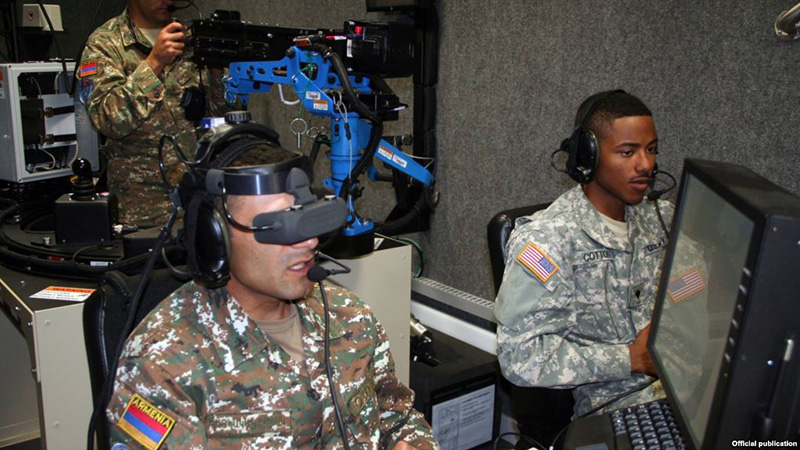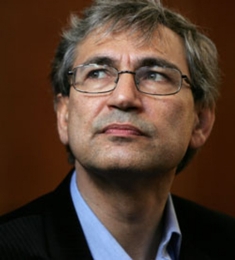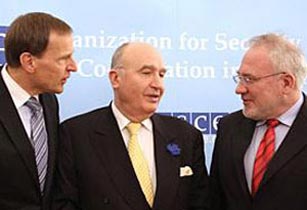WASHINGTON, DC — Today, senior Member of the House Foreign Affairs Committee and Armenian Caucus Member Representative Brad Sherman (D-CA) urged support for U.S. funding for demining efforts in Artsakh during the House Foreign Affairs Subcommittee on Europe, Eurasia, and Emerging Threats hearing entitled “Examining the President’s FY 2018 Budget Proposal for Europe and Eurasia,” reported the Armenian Assembly of America.
“Let’s talk a little bit about demining in Artsakh. Our assistance programs for what was then called the Republic of Nagorno Karabakh has since Fiscal Year 98 supported lifesaving maternal healthcare, provided for clean drinking water, and cleared mines and unexploded ordinance. HALO Trust, which is leading the demining efforts, reports that it has completed about 88% of its mission but continues to need US funds to continue its lifesaving work, additional humanitarian needs continue. Do we expect HALO Trust to be funded so that it can complete the demining effort?” Rep. Sherman asked.
U.S. Department of State’s European and Eurasian Affairs Bureau Acting Principal Deputy Assistant Secretary Ambassador John Heffern, in return, responded: “Over the years, as you know, we have given Nagorno Karabakh – the people of Nagorno Karabakh – $45 million in assistance, humanitarian as you described it, [for] water and demining. As I understood, the recent HALO Trust report estimated closer to 96-97% coverage on their demining efforts, which is very important, and there is going to be an assessment of that before we make decision on the next step.”
U.S. Agency for International Development (USAID) Europe and Eurasia Bureau Acting Assistant to the Administrator Margot Ellis added that demining is normally funded from their regional budget. “In the past we have sent a request to Congress for us to be engaged and we will put in a similar request,” she added.
Rep. Sherman also raised the importance of negotiating a bilateral tax treaty with Armenia and making this agreement a high priority at the State Department. He stated: “We’ve seen a surge in U.S. commercial engagement with Armenia, including as reported by the Ambassador upwards of $500 million in new American investments in the Armenia energy and mining sectors.” Sherman continued: “the Department of Treasury has to prioritize where to put their tax lawyers, and a number of other countries want to negotiate these agreements with us. But it occurs to me that we have a national security interest in making sure that we have good commercial ties with the former Soviet states.” Sherman noted that the Armenian government has gone on record stating that they will base it on the American model.
Earlier in the hearing, Amb. Heffern said that the U.S. is trying to move from an assistance-based relationship to a trade-based relationship with Armenia. Ellis added that USAID “decided to focus on the IT and energy sectors because these were sectors that not only could promote Euro-Atlantic integration, but also provided opportunities for U.S. business expansion and partnership with Armenia.”
In her written testimony, Ellis stated: “USAID works closely with the EU and other European donors to prioritize assistance, jointly fund projects, and attain maximum leverage while avoiding duplication. In Armenia, for example, we are partnering with the private sector, the host government, and Yerevan State University in a public-private partnership for the ‘Establishment of Innovative Solutions and Technologies Center Project’ worth $7 million over the course of three years. USAID’s investment of $2.5 million is yielding $4.5 million in non-USG funding in support of this program, which will develop and strengthen the educational capabilities of Armenian higher educational institutions in information technology and enhance their research potential in education.”
“While we appreciate U.S. assistance toward more trade and investment with Armenia, those efforts are necessary, especially considering the ongoing debilitating effects of the coordinated Azerbaijani and Turkish blockades of Armenia and Artsakh,” Assembly Co-Chairs Anthony Barsamian and Van Krikorian said. “Section 907 of the Freedom Support Act precludes most U.S. aid to Azerbaijan, with the exception of democracy building and humanitarian assistance, ‘until the President determines, and so reports to the Congress, that the Government of Azerbaijan is taking demonstrable steps to cease all blockades and other offensive uses of force against Armenia and Nagorno-Karabakh’ or the President issues a waiver for reasons of U.S. national interests. Considering the mounting evidence against the Aliyev regime across the board, Armenia and Artsakh should be receiving more U.S. assistance in addition to trade and investment programs,” they concluded.










